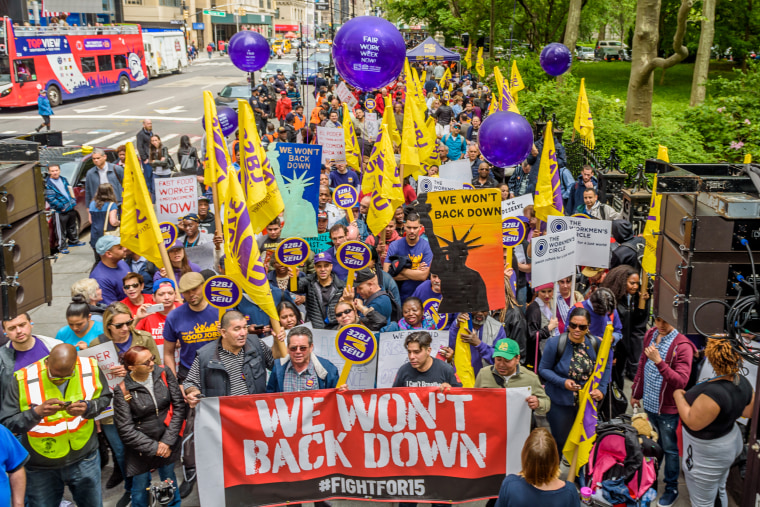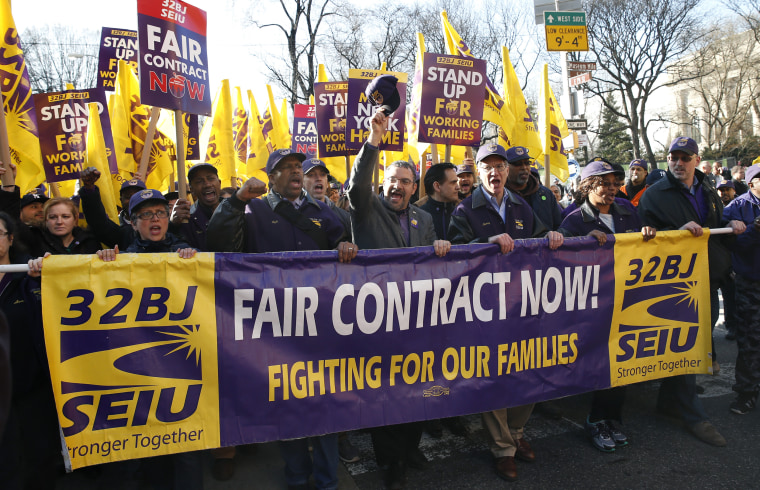Labor unions face an uncertain future as membership numbers decline. But labor activists and scholars point out that growing numbers of Latino members could help strengthen labor's message as unions broaden their causes to include civil rights, gender and immigration issues while they focus on voter engagement and registration.
“We are in robust dialogue in this country to recognize union strength and worker power as a way to achieve success on so many fronts," says Maria Peralta, national political director at the Service Employees International Union (SEIU). "Whether it is health care or the environment, engaging Latinos on different levels can shift the power of the economy.”
Labor organizers point to unions' growing dependence on brown and black members, including a significant number of immigrants, particularly in the service and health care industries. Scholars who study unions point to the decline of manufacturing jobs and the rise of service-oriented jobs. This in turn has broadened the conversation around workplace issues to include conditions that apply to workers in these service-oriented areas —and many of these conditions apply to nonunion workers as well.
SEIU backs the The Fight for 15 campaign, which initiated a walkout by McDonald’s workers demanding to raise the minimum wage to $15 an hour and address issues of sexual harassment and violence against workers.
With the growing dependence of Latino families in their ranks, unions have been more vocal about immigrant rights and legislation, for instance praising the passage of the House's bill on Tuesday to give citizenship to the so-called Dreamers and temporary protected status, or TPS, holders.
“The building trades industry cannot afford to lose long-standing and experienced professionals, currently in high demand due to labor shortages and to maintain a highly skilled workforce," stated Ken Rigmaiden, general president of the International Union of Painters and Allied Trades. The union is part of a broader coalition, Working Families United, which put out the statement supporting the House bill.
Armando Ibarra, chair of the Chicano and Latino Studies Department at the University of Wisconsin-Madison and author of The Latino Question: Politics, Laboring Classes and the Next Left, says union power extends beyond the workplace.
"Union power is in its membership, in its union members that can knock on doors, and they have a collective agenda, both political and economic on the job site and in their communities," Ibarra says. As Latinos grow in union ranks, it makes their voices more relevant.
Despite labor's decline, Latino growth
The percentage of workers who belong to a union has dropped from 20 percent in 1983, when comparable numbers were first collected, to 10.5 percent in 2018.
Yet statistics reported by LCLAA show a steady increase in the number of Latinos joining labor unions. Latinos make up almost 17 percent of the workforce, according to the Bureau of Labor Statistics (BLS) and are projected to be more than 20 percent by 2026. Currently, 9.3 percent of Latino workers are in unions.
Latinos in particular are affected by substandard working conditions, according to a report from the Labor Council for Latin American Advancement (LCLAA). Latinos make up the largest number of workplace deaths and injuries, and labor laws allow children as young as 12 to work on farms. With Latino workers heavily represented in agriculture, this law often has a high impact on the educational attainment and safety of young Latinos.
Workplace issues addressed by union activists, such as a demand for predictable work schedules, sexual harassment and a right to know cause after a job termination can help resonate with a broader audience, according to Laura Bucci, an assistant professor who studies labor unions at St. Joseph’s University.
Political mobilization
Labor can't outspend businesses, says Bucci, but it's good at acting as a connective tissue in communities, “a group of people you have to reckon with in some way in November, and that changes political outlooks. If you have a group of people who can door knock for you, then that is something easier to see as a threat or a benefit,” Bucci states.
“There’s a reason that labor has been under attack for the past 40 years," Ibarra says. Those who oppose labor's influence see them not just on economic terms but as a "working class movement."
For Latinos, unions have been an effective apparatus to mobilize their voting power in states that are less hostile to organized labor. This, in turn, has helped Democrats.

Ibarra points out the transformation of Nevada into a growing Democratic state largely because of Sen. Harry Reid's embrace of labor organizers fueled by Latino workers in the service union.
Democrats, who align with labor on issues such as higher minimum wages and immigration, should recognize that labor participation helps translate Latino numbers into tangible votes, Ibarra told NBC News. Similarly, labor needs the support of legislators at a time when their influence is continuously challenged.
Democratic presidential hopefuls have been publicly supporting the Fight For Fifteen.
Julián Castro marched alongside SEIU President Mary Kay Henry and the Rev. William Barber II, co-chair of the Poor People’s Campaign: A National Call for Moral Revival in a show of support for the strikers. Castro, as well as Sens. Bernie Sanders, Elizabeth Warren, Kamala Harris, Cory Booker and Amy Klobuchar support a $15 minimum wage for U.S. workers. Both Beto O’Rourke and Mayor Pete Buttigieg released videos on Twitter to show their support for the striking Fight for Fifteen workers, as well.
In a recent event, Rep. Alexandria Ocasio-Cortez went back to her bartending days to raise awareness of low wages, high housing costs and hostile work environments, all common in the service industry, which disproportionately impacts women.
"I remember working in a restaurant and you'd have people say something inappropriate or touch you and it'd be the 28th of the month and you'd have a rent check to pay," she said.
As income inequality becomes an increasingly resonant issue and Democrats continue to point out the disproportionate impact of the GOP tax cuts in favor of the wealthy, labor-based campaigns like #FightFor15 may indeed trigger greater empathy for progressive Democratic policies, such as the Green New Deal. In a recent announcement, the SEIU was the first major union to support the sweeping environmental campaign introduced by Ocasio-Cortez.
In a press release issued by Hector Figueroa, president of 32BJ SEIU, stated, "For labor unions like ours, climate change is an environmental issue, an economic opportunity and a political challenge that we know can destabilize our communities. This is an opportunity to tackle economic inequality and re-industrialize America with a green economy through jobs that, with the right training, can provide career ladders for many low-wage workers who struggle to afford the high cost of living."
Ahead of 2020, Latino labor leaders see an opportunity to energize their ranks as well as voters in their communities. But they say this also requires leadership that reflects the membership on the ground.
“We need to make sure that Latinos are at the highest levels of all the different unions," says Hector Sanchez, executive director for The Labor Council for Latin American Advancement (LCLAA).
Hispanics need to be, Sanchez says, "in all the strategic infrastructure of the labor movement, and also in the political infrastructure of the nation.”
FOLLOW NBC LATINO ON FACEBOOK, TWITTER AND INSTAGRAM.

